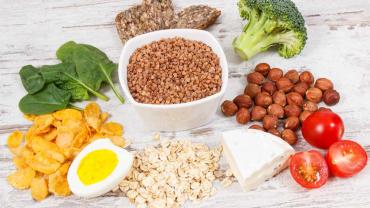
Inflammatory bowel disease (IBD) is an autoimmune condition where in most cases there are multiple triggers chronically stimulating the immune system over a long period of time in multiple ways and the immune system gets into overloaded, overwhelmed state and loses its ability to function leading to chronic inflammation causes symptoms such as diarrhea, abdominal pain, and other debilitating symptoms and anemia.
According to a study published last Tuesday in the Journal of Crohn’s and Colitis, researchers investigated the effect of riboflavin supplementation in patients with Crohn’s disease. Riboflavin has antioxidant, anti-inflammatory, and modulatory effects on the microbiome.
This was a prospective clinical intervention study consisted of 70 patients with Crohn’s disease with varying disease severity. Each patient received 100 mg of riboflavin daily for a 3-week period. Clinical and laboratory assessment included the Harvey-Bradshaw Index (HBI), inflammatory and antioxidant biomarkers, and comprehensive testing of the gut microbiome at baseline and at the end of the study.
As a result, riboflavin supplementation significantly decreased inflammatory markers as well as the Harvey-Bradshaw Index. In addition, IL-2 levels decreased in patients with low fecal calprotectin and C-reactive protein decreased in those with high fecal calprotectin levels at baseline. An overall reduction of systemic oxidative stress was demonstrated as free thiols significantly increased after supplementation. Riboflavin supplementation also led to a reduction of Enterobacteria in the patients with low fecal calprotectin levels. This data demonstrates the potential anti-inflammatory and antioxidant effects of ribloflavin supplementation in patient with Crohn’s disease.
One must also investigate into the other potential environmental triggers that can cause inflammation such as, food sensitivities, toxins, and molds. Also, stool testing is essential as one can rule of bacterial infections and dysbiosis as well as assess inflammatory, immune, digestion, and absorption markers.
High dose probiotics, fish oil, curcumin, glutamine, and mucilaginous botanicals are helpful in immunomodulation and for their anti-inflammatory properties. Other common deficiencies include magnesium, vitamin D, and iron. A specific carbohydrate diet (SCD) or elimination diet may improve gastrointestinal function and decease disease activity.
By Michael Jurgelewicz, DC, DACBN, DCBCN, CNS